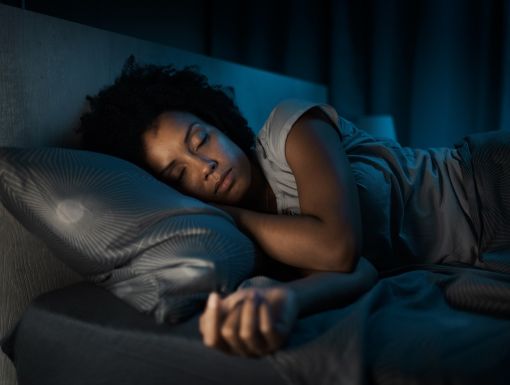
5 Natural and Over-the-Counter Sleep Aids That Work
Quality sleep can help you maintain a healthy weight, boost your immune system, and reduce inflammation. It can also enhance mental health by improving mood, memory and problem-solving skills.
Chronic sleep deprivation can increase the risk of serious conditions such as heart disease and stroke.
In a world where quality sleep is increasingly harder to get, many adults are searching for effective solutions to enjoy more restful nights. From natural supplements to over-the-counter sleep aids, a wide range of products claim to relieve insomnia and improve sleep quality.
Are popular non-prescription options, including sleep aid gummies, melatonin and other natural remedies, effective?
What are some natural sleep aids?
Natural supplements that are known to promote restful sleep include:
- Melatonin: A natural hormone produced by the body for sleep. It helps regulate your sleep-wake cycle by signaling to your body that it's time to wind down.
- Sleep gummies: A form of melatonin that comes in doses ranging from 1 milligram to 10 milligrams.
- Magnesium: Magnesium aids sleep by increasing levels of GABA, a neurotransmitter that promotes relaxation. Found in seeds, nuts, and leafy greens, magnesium supplements can support deeper sleep.
- Chamomile: Known for its calming properties, chamomile tea can serve as a soothing bedtime ritual. However, those with allergies to chamomile or certain medications should exercise caution.
- Valerian root: Available in teas and supplements, valerian root is known to reduce the time it takes to fall asleep. While generally well-tolerated, it may cause mild side effects like dizziness.
How effective are sleep gummies for sleep?
With their pleasant flavors and convenient format, sleep aid gummies have quickly become a popular over-the-counter solution for those struggling with insomnia or occasional sleeplessness. Melatonin is a main ingredient in most sleep aid gummies, used to promote relaxation and support better sleep.
As you age or experience disrupted routines due to stress, travel or screen exposure, natural melatonin levels can decline, making melatonin supplementation a helpful sleep aid. Gummies offer a tasty and easy-to-take option, especially for those who dislike pills.
For the best results, take sleep aid gummies 30 minutes to an hour before bedtime. Start with the lowest effective dose, typically between 1mg and 3mg, to minimize potential side effects like headaches, dizziness, or grogginess. While doses up to 10mg are available, higher amounts aren’t always more effective and can sometimes be counterproductive.
To get the most out of sleep aid gummies, combine them with good sleep hygiene practices:
- Maintain a consistent sleep schedule
- Avoid blue light from screens at least an hour before bed
- Create a calm, dark, and cool sleep environment
- Limit caffeine and heavy meals close to bedtime
Sleep aid gummies should be viewed as temporary aid, not a long-term solution. Addressing underlying causes of sleep disturbances like stress, poor sleep habits or lifestyle factors is essential for long-lasting, high-quality sleep.
Which over-the-counter sleep aids are safe to use?
Over-the-counter (OTC) medications can provide temporary relief for people struggling with sleep issues, but they should be used carefully. While effective for short-term use, these medications can lead to side effects such as grogginess, dry mouth or tolerance build-up if taken regularly.
It is important to consult with a healthcare professional before starting any OTC sleep aid, especially if you have underlying health conditions or are taking other medications.
In addition to natural options, several over-the-counter medications like Unisom and Tylenol PM contain antihistamines with sedating properties. While these can be effective short-term solutions, they may lead to side effects like heart rhythm abnormalities, dizziness, constipation, urine retention and daytime fatigue.
These medications should be used sparingly and are not recommended for those over 65 due to increased fall risks.
How to choose the right sleep aid for you
Selecting the right sleep aid involves understanding your specific needs and considering both natural and over-the-counter options. Here are some additional tips to guide your decision:
- Identify the root cause: Determine whether your sleep issues stem from stress, an inconsistent schedule, or an underlying health condition. Addressing the root cause is key to finding the most effective solution.
- Consider your lifestyle: If you travel frequently or have an unpredictable schedule, melatonin-based products may help regulate your sleep-wake cycle. For occasional stress-related sleeplessness, herbal remedies like chamomile or valerian root might be more suitable.
- Evaluate side effects: Research potential side effects of any sleep aid you’re considering.
- Start small: Begin with the lowest effective dose of any sleep aid to minimize side effects and assess its impact on your sleep quality.
- Check for interactions: If you’re taking other medications or have chronic health conditions, consult a healthcare provider to ensure your chosen sleep aid won’t cause adverse interactions.
- Trial and error: It may take some experimentation to find the sleep aid that works best for you. Keep a sleep journal to track your experiences and identify patterns.
If your sleep issues persist despite trying various aids, it’s important to consult a healthcare professional or sleep specialist. They can help determine the safest and most effective options for you, provide tailored recommendations, and explore potential medical treatments. Long-term insomnia may also require a deeper investigation into underlying health issues to address the root cause.
For those seeking additional guidance, Ochsner Pharmacy and Wellness offer consultations to help you navigate your options and find the best sleep aid for your needs.



